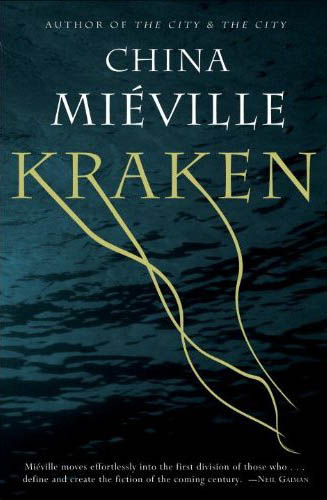![]()

I had been waiting for China Mieville’s Kraken for just about a year, ever since his last novel City & the City came out stateside in May, 2009. I’ve read everything by Mieville to date and every book has been amazing. However…
Kraken is… maybe a bit of a mess.
We all know how it is – sometimes when you wait for something for a long time it can fail to live up to the anticipation. That’s only natural. I’ve figured this into the equation, and it is of course a valid point, except that I also waited for City & the City for probably about as long and it didn’t just live up to the anticipatory fervor – it blew the fucking top off it. I’ve been reading Kraken for about two weeks now and it’s just… messy. Or maybe it’s me. Ah, well, let me explain.
City & the City surprised me in that it was so tightly plotted I read it in two days, despite the fact that it was built around a completely abstract concept: two cities that exist within the spatial confines of one. Besźel and Ul Qoma are one city divided into two by the dogma of their citizens and a secret policing organization known only as Breach. Breach acts a very Orwellian agency, never manifesting except in the hushed concerns of those who know people who have disappeared. This gets into the realm of ‘thought crime’ here, as in Besźel and Ul Qoma it is illegal to acknowledge anything in the other city, even though the building next to your house may in fact be distinguished as being such. If this sounds strange and convoluted it is only for my perfunctory description – Mieville handles the material with a subtle deftness that many times while reading it brought an amazed and worshipful tear to my eye. It is just that damn good.
Conceptually then, you can see how I’d be surprised that a novel such as City would only take me two days*. Mieville’s other books (with the exception of the far simpler pleasure of his debut King Rat) all took me at least a week to read. His Bas Lag books, starting with Perdido Street Station, continuing in The Scar and thus far concluding with Iron Council were all very enjoyable challenges – they are fantasy but with a hard ‘f’. Mieville himself is sometimes referred to as ‘the anti-Tolkien’ for his outspoken criticism of the fantasy genre as a self-perpetuating worship forum for Lord of the Rings-esque stories. Mieville’s fantasy is anything but, lending itself quite well to the not-too-official label of ‘The New Weird’ – an allusion to H.P. Lovecraft, Robert E. Howard and other early twentieth century pulp writers. Kraken is definitely less fantastical in its fantasy; more akin to Neil Gaiman’s urban fantasy. And yet it is in the fantastic that I believe Kraken gets a bit lost in itself.
My initial impression of Kraken was awe. Not awe at concept or character but awe in the fact that the style begins very similar to his aforementioned debut King Rat, so that what I had first assumed was a voice he had grown out of with experience was simply one of several he already possessed and is able to store in his back pocket until needed once more.
That’s fairly awesome.
However, as Kraken moves it picks up a whirlwind of ideas and characters. Many of these are amazing, but at some point it begins to feel as though the core story, that of an apocalypse touched off by the theft of a giant squid from London’s Natural History Museum’s Darwin Centre, suffers immensely from the inclusion of so much fictional detritus. This is interesting because for sure all three Bas Lag novels contain similar whirlwinds of ideas; Kraken just simply feels as though at points it slips from the authors grasp. Mieville always regains that grasp, but the ebb and flow can be a massive distraction to the reader.
Whenever a creator I love does something that disappoints me at first I always A) consider the possibility that it is probably me and not them, and B) eventually re-examine the piece. Although I am struggling with Kraken now I will no doubt finish it, set it with a distracted reverence on my shelf next to his other novels and then return to it at some point in the future to see what another run-through will tell. More than once I’ve found timing is everything, and I’ve recovered some real gems with the ‘why-the-hell-didn’t I-get-this-last-time-around’ kind of experience in the past. My feeling, especially with artists or writers who challenge both their readers and themselves with their work, is that a first reading is not always enough to crack a sufficiently sophisticated piece of work.
……………….
* Despite what it may sometimes sound like, I am not a fast reader. That’s my wife.